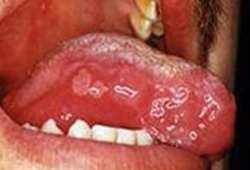Summary
Definition
History and exam
Key diagnostic factors
- increased predisposition in certain ethnic/geographic groups
- oral ulcers
- genital ulcers
- uveitis
- acne lesions
- erythema nodosum
- limited duration of symptoms
- superficial thrombophlebitis
- hypopyon
- stroke
- eye pain, blurry vision, photophobia, or photosensitivity
- memory loss
- headache, confusion, or fever
- haemoptysis, cough, shortness of breath, or chest pain
- eye redness or tearing
- impaired speech, balance, or movement
Other diagnostic factors
- cramping abdominal pain, diarrhoea, or gastrointestinal ulceration
Diagnostic investigations
Investigations to consider
- pathergy testing
- rheumatoid factor
- anti-nuclear antibodies
- anti-neutrophil cytoplasmic antibodies
- HLA-B51
- lumbar puncture
- MRI, magnetic resonance angiography brain with contrast
- colonoscopy
- upper gastrointestinal endoscopy
- high-resolution chest CT
- CT angiography of chest
- pulmonary angiography
Treatment algorithm
Contributors
Authors
Yusuf Yazici, MD

Clinical Associate Professor of Medicine
New York University School of Medicine
Director
Behcet's Syndrome Center
New York University School of Medicine
NY
Disclosures
YY has received research support from Amgen, Genentech, and Bristol-Myers Squibb. YY is a consultant for Bristol-Myers Squibb Chugai, Hemay, and Amgen. He is an author of some of the references cited in this topic.
Peer reviewers
Izzet Fresko, MD
Associate Professor of Medicine
Department of Rheumatology
Cerrahpasa Medical Faculty
Istanbul
Turkey
Disclosures
IF declares that he has no competing interests.
Megan E.B. Clowse, MD, MPH
Assistant Professor of Medicine
Division of Rheumatology and Immunology
Duke University Medical Center
Durham
NC
Disclosures
MEBC has received speaking fees from Abbott Pharmaceuticals.
Philip Seo, MD, MHS
Assistant Professor of Medicine
Division of Rheumatology
Johns Hopkins University School of Medicine
Co-Director
Johns Hopkins Vasculitis Center
Baltimore
MD
Disclosures
PS declares that he has no competing interests.
Use of this content is subject to our disclaimer
